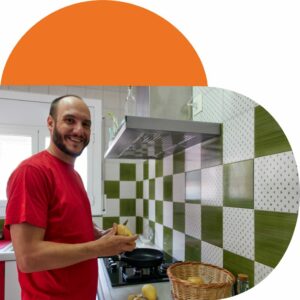
Our priority outcome: To increase the number of people living in stable and appropriate accommodation.
A home where you feel safe and happy is crucial to good mental health.

Context and key challenges
The continuing impact of the cost-of-living crisis means more people are struggling to pay rents and mortgages or have lost that struggle. This would cause stress and anxiety for anyone and can trigger crisis, especially for those with existing mental health issues. We continue to work closely with our providers and the community to maximise the availability of appropriate housing for those with mental illness and to provide practical support for issues such as debt and hoarding.
Even before the recent high rates of inflation the cost of services bought when needed (known as spot placements) has been rising. For example, the chart shows that the average weekly cost of Supported Living Placements has risen by 72% over the six years of the Alliance. Though, note that this reflects a combination of rising prices and increased support needs.
What we offer
Supported Living
We buy a large number of ‘supported accommodation’ services. These range from a few hours a week supporting someone in their own home (for example to ensure medication is taken) to 24 hour supported specialist accommodation for those with greater needs. We recently reviewed and updated many of these contracts to improve the support provided and make it more relevant to the needs of those we support.
Our Tree House provides 24/7 support for people leaving hospital beds. We also have a range of other supported accommodation. Some of this is 24/7 supported, while others offer visiting support when needed. For example, we have 17 flats, sourced through Thames Reach. which provide homes for people who are ready to move on from hospital and live more independently.
We’re working closely with our Housing colleagues in the Council to make the best use of social housing in Lambeth, which is of course in very high demand.
Staying Well
Our Staying Well Team that works across primary care (GPs and community based services) and secondary care (acute beds, Living Well Centres and other Alliance services) to support more people to live independently in their homes and communities.
Hospital discharges
We continue to streamline and improve our hospital discharge process to make it easier for someone to go straight into supported accommodation or their own home without having to go through a further assessment. This speeds things up, ensuring people do not stay longer than necessary in an acute ward. It also frees up beds for others who may need them. As an Alliance we meet weekly (and in recent times, daily) to support the discharge of people who remain in an acute hospital bed after they’re clinically ready to be discharged.
Our impact
In 2023/24 our CLaSS (Community Liaison and Support Service) team supported 228 people to be discharged from an acute bed. Of these 80 (35%) initially went to temporary accommodation, which is usually a bed and breakfast
Our next steps
Homewards programme
We are delighted to be part of the Prince and Princess of Wales’ Homewards programme, that aims to end homelessness in five years. Lambeth is one of six flagship locations across the UK that brings together voluntary, community, public and private sector organisations locally to develop practical solutions to all forms of homelessness. It launched in Lambeth in February 2024, with over 80 members from a range of sectors including housing, mental health, property, private sector, education and charities. The Duchy of Cornwall and Lambeth Council are developing plans to create a site comprising a 17 bed ‘move on’ accommodation for young people.
Home First
We have launched a ‘Home First’ pathway from hospital, that provides ‘wrap around’ holistic support from mental health professionals to support recovery alongside a housing offer or return to people to their own home. This will make it easier for people to live in less restrictive supported accommodation and have more personalised support. It supported 90 people in its first six months.
As with our priority around independence, we’re continuing to improve the way we work so people can have greater independence sooner by:
- reviewing how we make referral and discharge decisions,
- finding and addressing anything that may be preventing someone from being discharged sooner,
- improving supported accommodation services,
- developing and expanding our Staying Well approach, [insert link to explanation of Staying Well in section in the document]
- introducing new roles such as community reablement workers, mental health practitioners in GP surgeries and transitions workers for children and young people turning 18.
This is a particularly difficult area to measure our impact. Whether accommodation is appropriate is largely down to each person’s own perception. We’ve therefore started to ask the people we support this question and will publish the results here in the future.
Can you help us?
We have a short survey that anyone who use our services is invited to complete. It will take less than three minutes and will tell us how well we are doing and what we need to improve.